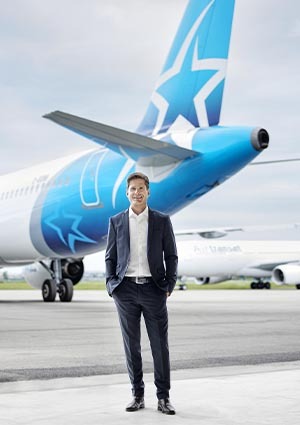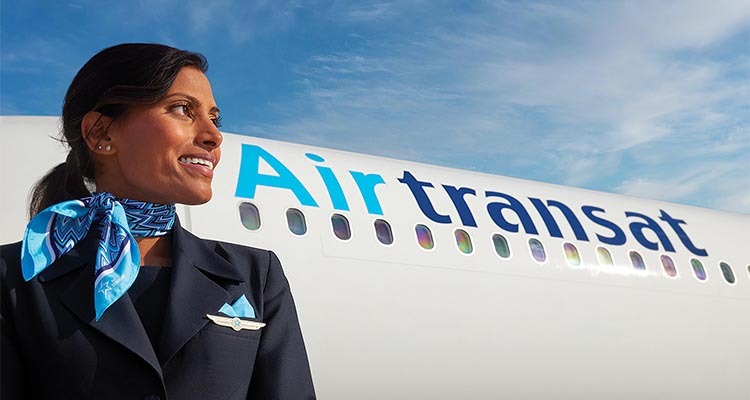Delve into Air Transat’s journey from vertically integrated tour operator to renowned international airline
Since its inception in Montreal 36 years ago, Air Transat has achieved worldwide recognition as a provider of leisure travel. Notably, Air Transat operates as an airline under the Transat A.T. Inc. (Transat) brand, a leading integrated international tourism company specializing in leisure travel. Under the Transat and Air Transat banners, the company offers various vacation packages and flights to a staggering 56 destinations in 30 countries in the American continent and Europe, and as of June 2024, in Africa. Indeed, understanding that a significant investment was essential to its operations and the destinations it serves, the company has renewed its fleet with the most energy-efficient aircraft in its category. Marc-Philippe Lumpé, Chief Operations Officer at Transat, provides a comprehensive overview of the corporation.
overview of the corporation.
“Similar to companies like TUI and Thomas Cook, Air Transat originally operated solely as a vertically integrated tour operator in North America. However, alongside this, we owned an airline branch, which mainly served travel routes to Europe, the Caribbean and Mexico. This airline developed over time, until a couple of years ago, when our newly appointed President and Chief Executive Officer, Annick Guérard with her team, developed an approach which saw a switch from our tour operator model to that of a more airline centric business model. Although the tour operator is now a complement to our airline, it is still producing 30 percent of our revenue and remains a crucial part of the business. People still appreciate the value offered by tour operators, especially in Canada. As a result of this transformation, Air Transat transitioned from a point-to-point model towards a hub and spoke model, empowering us to drive continued growth,” he says.
In 2023, Air Transat was voted World’s Best Leisure Airline by passengers at the Skytrax World Airline Awards. Reflecting on this achievement, Marc-Philippe highlights what sets the company apart from competitors. “I believe our distinguishing factor lies in our key emphasis on service which goes well above the standards set by our industry and category. Air Transat prioritizes the overall experience our customers encounter during their journey. To that end, we offer a very good economy product as well as a superior premium economy option known as Club Class. While I won’t claim Club Class is unparalleled in the market, it certainly outshines numerous counterparts. Club Class combines the best features of a variety of premium economy products, thus delivering exceptional value for money for travelers. Beyond that, this package offers an impeccable level of service both on the ground and in the air,” he emphasizes.
Hub and spoke model
 Air Transat offers these services across an ever-expanding range of destinations. “We have a very strong presence in North America and Europe, albeit with fluctuations driven by seasonality. This means that during the summer months, a significant portion of our flights operate on European routes whereas in winter, the bulk of our routes shift towards destinations in warmer southern locations. To better cater to winter travelers, we are expanding our operations in South America, with Lima being the latest addition to our route network. Additionally, we have recently introduced routes to Marrakesh and solidified our presence in Western Europe. Throughout the summer, some of our most coveted destinations include Dublin, Glasgow, Amsterdam, Brussels, as well as various locations in Spain, Italy, and France. Thus, there is a noticeable trend towards European flights during the summer season compared to winter. Moving forward, one of our objectives is to mitigate this seasonality by achieving a more balanced distribution of flights throughout the year,” Marc-Philippe explains.
Air Transat offers these services across an ever-expanding range of destinations. “We have a very strong presence in North America and Europe, albeit with fluctuations driven by seasonality. This means that during the summer months, a significant portion of our flights operate on European routes whereas in winter, the bulk of our routes shift towards destinations in warmer southern locations. To better cater to winter travelers, we are expanding our operations in South America, with Lima being the latest addition to our route network. Additionally, we have recently introduced routes to Marrakesh and solidified our presence in Western Europe. Throughout the summer, some of our most coveted destinations include Dublin, Glasgow, Amsterdam, Brussels, as well as various locations in Spain, Italy, and France. Thus, there is a noticeable trend towards European flights during the summer season compared to winter. Moving forward, one of our objectives is to mitigate this seasonality by achieving a more balanced distribution of flights throughout the year,” Marc-Philippe explains.
Next, Marc-Philippe discusses the recent expansion to Air Transat’s code sharing agreement with Porter Airlines. “Our aim with this move is to further strengthen our partnership with Porter Airlines. We are now in the process of building a joint venture between our two companies. The vast range of aircraft Porter operates empowers regional flying, including routes further into the US, which seamlessly integrate with our network. I believe this expansion is going to foster closer alignment and deeper cooperation between our companies, exemplifying our hub and spoke model in motion,” he adds.
Modern and efficient fleet
Committed to sustainable travel, Air Transat embraces a multifaceted approach to address the carbon emissions associated with the aviation industry. “A key component of our strategy to achieve carbon neutrality is the use of Sustainable Aviation Fuel (SAF). I firmly believe that leveraging SAF is going to be crucial in achieving our target to be fully carbon neutral by 2050. However, there is an ongoing challenge in terms of SAF production in Canada, which we hope will be overcome in the near future. Lastly, to bolster our sustainability endeavors, we operate a modern and efficient fleet on the narrow-body side. Air Transat is also looking to further develop the efficiency of its wide-body fleet and further reduce fuel consumption,” he ends.
Through its renowned focus on providing excellent services to customers worldwide and its commitment to sustainability, Air Transat is poised to continue connecting travellers well into the future.
